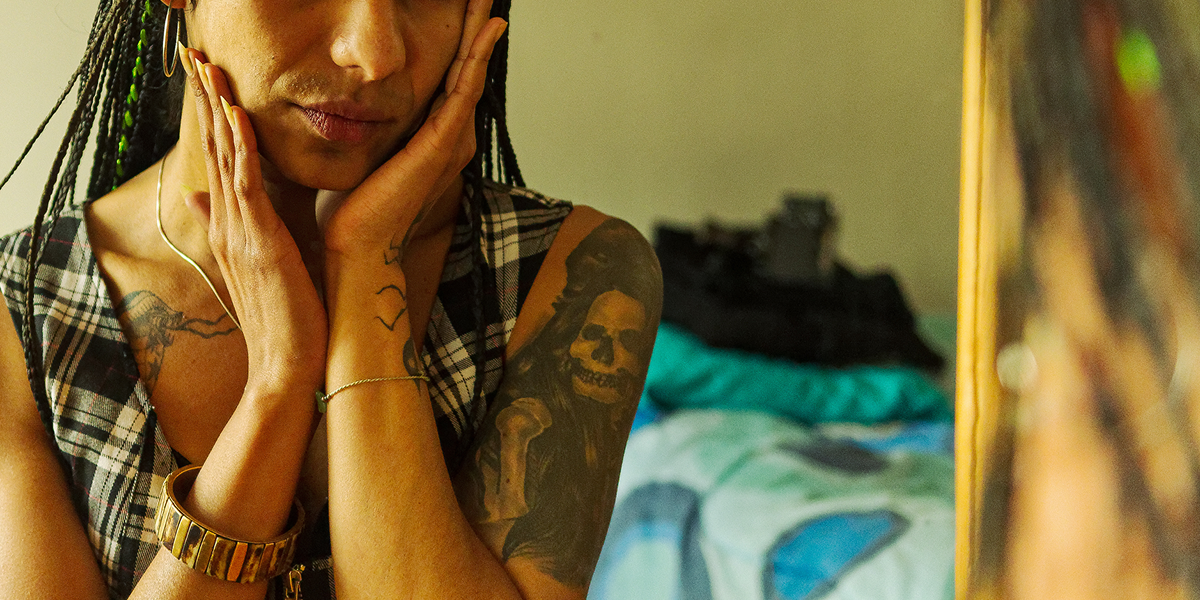“Okay, we’ll start by having her walk across the room a few times, and just call out what you see.”
I’d agreed to be their guinea pig as a favor. My friend, a physical therapist, asked me to come in for Patient Day, when aspiring PTs at her alma mater rack up hands-on experience. I figured I’d learn some new exercises, refresh the old ones, and walk away with a $20 Target card for my trouble.
Instead, I got sized up:
“Increased anterior pelvic tilt.”
“Shortened hip flexors.”
“Decreased lumbar lordosis.”
I’m no stranger to this language; cerebral palsy makes sure of that. I knew that my hip flexors were tight before I knew where they were. I’ve learned more about the angle of my pelvis than should ever be required outside of yoga. Certain spots on my body always inspire the same discussions. And that’s the thing I’ve found about medicine — it has a pretty limited vocabulary.
There are few relationships more tangled than the one between disabled people and doctors. Their diagnosis welcomes you to the club, provides terminology for what’s going on, and confirms that it’s not a benign variation like red hair or even nearsightedness. They determine that Something Must Be Done. And if you have the resources, they do it: point the way to specialists, recommend assistive technology, cut you open to add reinforcements, and monitor your disability’s development alongside yours. They are the gatekeepers to this label and to the tools that can help you wear it.
It’s tempting to believe that’s enough. Thinking of disabilities as medical conditions makes them easier to digest; it puts the doctors in charge and lets everyone keep assuming that life with a disability is horrible, or at least something no one would want. (If you doubt that’s how we’re supposed to feel, let me direct you to the total strangers who’ve told me “if I were you, I would have killed myself!”… as a compliment.) But that understanding is a conscious choice. Disability can also be an identity, and as I’ve grown into mine — made it a Thing About Me rather than a Thing That Happened to My Body — I’ve sensed an ideological gap forming between me and my doctors. I fell right into that gap on Patient Day. It reminded me that, as a disabled woman, I can’t enter any medical environment assuming I’ll be understood, protected, or even told that I’m fine. I have to go in with my guard up every time. And that’s coming from me — white, insured, ambulatory, independent, employed. The kind of disabled person we like in America.
“Just call out what you see.” That was their assignment. But they only gave one kind of answer. You know what else they could have said? “She walks unassisted.” “Her pace is consistent.” “She gets around pretty well.” But they weren’t interested in what they saw; they were interested in what they saw wrong.
“Increased,” “shortened,” “decreased” — they all compare me to something. But they also offer a clue to bridging that gap.
I’m sure that, somewhere in my medical record, my doctor has noted that I am gay. Maybe she scribbled it in a margin, maybe it’s as clinical as a checkbox that says “Orientation: Homosexual.” I don’t know. But I can guarantee that she didn’t write down “Increased Homosexual Attraction,” “Shortened Patience for the Male Species” (though I do also have that), or “Decreased Heterosexuality.” My sexuality gets to stand on its own and doesn’t have to prove its legitimacy in relation to something else. Obviously that hasn’t always been so (and still isn’t for far too many people). But hearing my particular brand of queerness emerge from the medicalization shadows reminds me that language really does move the needle. And we haven’t quite gotten there with disabilities yet. People are still most comfortable discussing my disability as a deficiency — I can do things “anyway,” or “despite it.” And that goes double in medical circles, because then you start seeing words like “normal” and “abnormal,” “lowered fine motor function” (lowered from where?) or, my personal favorite, the assurance that my “case” is “mild.”
If there’s one thing I wish I could tell every medical professional who’s worked on me (and they are legion), it’s this: please don’t assume I want to be able-bodied. I know it’s easy to vilify cerebral palsy when you don’t have it. And actually, it’s even easier when you do, because the rumors are true: it’s exhausting, frustrating, cumbersome, and expensive. It’s also right up there with my gender and sexuality in terms of what colors my world. It is a key component of my personhood. I don’t know what life is like without it and don’t plan on finding out. I get that able bodies are the gold standard; the rest of the world makes that perfectly clear. But when I’m in your office or lab, you can at least make mine feel welcome. And saying that my muscles are “weaker than we’d expected” or telling your students “I don’t think she’ll be able to do this” when I am right in front of you isn’t being scientific or objective — it’s assigning value to the way I exist. It’s measuring me against standards I will never understand, a body I will never have, and a person I will never be.
Forming new habits isn’t easy, especially when your entire profession runs on a highly specialized vocabulary — but you know what else isn’t easy? Listening to how “abnormal” my body is. So, my dear physician/surgeon/physical therapist/orthotist/gynecologist/neurologist, maybe instead of “decreased anterior pelvic tilt,” you can say “you lean forward when you walk.” That’s just true — no comparison or implication that I should be some other way. And if you want me to work on it, you can explain that “eventually, that might get tiring for your knees.” Make it about helping my body thrive and maximizing the opportunities I’ll have. That — rather than measuring it against an ideal that’s never been a reality to me — is quality of life.
When I went back to work with another PT class recently, they tailored their advice to my commute, which involves walking to the train and taking a lot of stairs. Every exercise I did related to how I move every day. They grounded my tasks in my lived experience. Did they slip into medicalese? Sometimes. But they also listened, didn’t mind getting called out, and understood that I am a person — not a class assignment, a case to be solved, or damage that needs fixing. They met me where I am.
I’ve thought a lot about what ideal doctor’s appointments would look like, which means figuring out what I’m not getting from them now. And I feel like we’re ignoring a crucial truth: that the doctor/patient relationship is an intimate one. We like to save intimacy for romance or sex, as if it’s too embarrassing or risky to express elsewhere. But medical professionals enjoy unrivaled access to our bodies. Not even the people we sleep with get to know what they know. They can literally see inside of us, any part they like. What’s more intimate than that? Our charts might look inscrutable and sterile, but they’re really detailed portraits, maps of our development that tell us what we can’t see and help predict where we’ll go. And the ideal appointment would acknowledge that. Trust, clarity, and communication would be shared values — not just onuses on me as the patient. I would know my doctor was on my team. I would have time to ask questions and get detailed answers. I would feel cared for rather than evaluated. Identity would coexist with diagnosis. And that, I think, would bridge the gap.








Comments
Ahh, thanks for writing this! I’m about to finish PT school and I see this happen a lot. All the articles you’ve written for AS have been so good. THANK YOU!
“If I were you, I would’ve killed myself!” Ugggggghh yes why do some able-bodied people think that’s a compliment?!? (I’ve had that one too, when people find out I experience chronic pain.)
I mean I’ve had people say that to me when they find out that I have a mental illness (and just so happens that a very high percentage of people with my mental illness will go on to attempt and/or commit suicide so like REALLY. REALLY. why do people say this. why.)
Carrie,
Thank you for sharing the hard work you’ve done to process your experiences with the medical people you interact with. As a long time pediatric PT I am grateful for your insights. Your writing manages to be instructive, without being as damning as it could be. I look forward to your next piece. Namaste.
This article is wonderful. I’m going to share it with all my PT friends.
I really needed this reminder. I get so carried away and rushed in my practice… And as much as I care about my patients dearly, I get into sucked into this trap of not using the most productive terminology.
Thanks for writing this.
This sounds as if it was a teaching exercise on gait analysis for the PT students’ benefit. In a teaching exercise of this type, the students should be learning the technical terms. The patient/demonstrator does not need to be in the room for the discussion, only to demonstrate the gait for the students. This would be different from a teaching exercise on how to communicate with patients eg how to take a history. Typically for the latter, since the “patient” does not need to demonstrate actual physical signs, the schools will use actors.
The class should be thanking you for helping them understand the gait characteristics in question, and if you choose to give them an education on what is easy and what is hard due to the gait, that would be icing on the cake.
I am assuming that the procedures used in medical training and PT training have similarities.
I feel like this is kinda missing the point, though. There’s a philosophy built into our medical system: a construct of an ideal body and interventions which remove deviations away from this ideal. Sometimes this can be a useful approach, but it shouldn’t be the end goal of medicine. The end goal should be, well, whatever the person wants it to be (i.e. quality of life). The difference between these two ways of defining goals becomes a lot more striking when you’re disabled. I believe the “ideal body” philosophy is apparent in medical language when people say things like “increased”, “elevated” etc. They are saying “your pelvis tilts forward more than normal” or “your pelvis tilts forward more than it should according to our ideal model” (which is actually not always based on a statistical analysis of the real population) rather than “you walk with your pelvis tilted forward” (objective fact) accompanied by a concrete reason why the person in question may want to change this (based on medical research).
So yeah, it’s not a matter of technical vs. non-technical language so much as the way of thinking about bodies, the inherent variation in people’s bodies and disability. And I would argue that an analysis of these issues should be built into every lesson in PT/med school.
It feels like your point is “this is how things are done now, therefore this is how they should be done” while Carrie is saying “there’s a problem with how things are currently taught/conceptualized in medicine and we should change it in this concrete way.”
brilliant comment :)
This is wonderful, your attitude rocks, and what you are saying about care, talking and listening, identity and autonomy here should be going into the health care codes of practice(if you have them in the US)!!. Thanks for making me happy to be the argumentative, alternative, question asking woman I am and thank you soooooooooo much for ‘Shortened Patience for the male species’. That’s got to be a coffee cup or t shirt for sure!
This is awesome. There’s so much here I want to quote and send to my doctors. The ideological distance between Thing About Me vs a Thing That Happened to My Body is huge, and many of the problems I’ve encountered dealing with health professionals for my own disabilities come straight from this TTHtMB mindset. So I really like how you hit the nail right on its head about this being one of the crucial differences between the medical(izing) community vs the activist/identity community, because it suggests a path towards reconciling these two discourses rather than simply lamenting their lack of communication.
There is simply not enough technical parameters and pseudo-latin. Pseudo-latin is cool, sounds like Warhammer 40K.
I will choose a technical approach every time and while i have the deepest respect for medical specialists and think they’re wonderful wizards from a higher dimension – it is matched by my contempt for generalists who imo should all be replaced by Cortana, as it would mean me having to listen to far less idiocy and ‘deeply visceral and human’ emo shit uttered by an incompetent.
No, the shortcomings of my primary vehicle/shell are not something i would want a drooling idiot holding power over me to consider essential about me – me the transcendent, glorious, majestic infomorph entity driving that vehicle. My vehicle is fine. Still not a looker maybe – but comfy, functional and armoured (not just physically – many lifesaving battles happen on the level of infosec before a physical action can take place).
Doctors are like car mechanics, paid to deliver a particular result, not to have an opinion or recognise my vehicle/shell as a ‘human being’. Which it btw isn’t. I, the entity driving it, am a sapient being (whether i class as human depends on the creation myth of choice, e.g. Sumerians had the concept of Second Creation that places me as separate design). My shell isn’t me, and if i happened to replace it (an act i am somewhat familiar with btw) by an all-metal one tomorrow – i would still be myself, still the same Serena.
It could be that my perspective is different only because i’m someone whose first concepts were ‘mummy’, ‘daddy’, ‘information’ and ‘carrier’, not necessarily in that order. But i’m not sure that essentialising your vehicles will benefit you in the long run. Not in a cyberpunk scenario, anyway.
Well described rebuttal to current medicine in general. If you can’t be cured or nearly cured with meds or surgery, we have a hard time with you. That disconnect may not from a reasonable understanding of the obvious lack of cure, but a value judgment on what comes afterwards. Its hard enough to find a partner in life that shares your values…it might be harder to find a healthcare provider. Or it will at least cost you a few hundred in shopping around outside of your insurance.
I love your writing. Thank you so much for the new perspectives.
Carrie, thank you for sharing this with us, it was beautiful.
There’s a doctor/writer in France called Martin Winckler, who’s probably one of the most radical doctors/writers I know, always fighting for patients (mostly women, as he publishes a lot on women’s rights in the medical world) to have their agency. I wish his way was the golden standard, it makes you dream of the kind of doctor you could have.
Medical professionals who get sued tends to relate more directly to poor communication than incompetence. This article is a reminder of why that occurs. Thank you for the terrific insight into the patients experience.
Thanks for sharing your experience! I forwarded this to some med students I know.
So many great points here – the one that hit me hardest is that the patient/ Doctor relationship is intimate. So true!
I have PTSD and doctors visits are one of my big triggers – I’ve worked so hard to build good relationships with my regular doctors so I feel safe and they know how to work with me. It’s a delicate dance and not all doctors are willing to attempt it.
This was a fantastic article
Thank you so much! It’s super validating to have someone else disabled say that comparisons and the word “abnormal” phenomenally offend them.
I always love your articles! I’m applying to medical school this summer and so much of what you write about is central to what I believe about what medicine should be. Anytime that I feel discouraged about my future, I just need to read your words to remember why my path is so important to me and how much responsibility I will have to my future patients.
I’m incredibly lucky to have been in an undergrad program that values communication, relationships with patients, and quality of life above all else. Many of the points you made here are things I’ve heard from multiple professors in my program which gives me hope for the future of our medical field. Here’s hoping the meaningful change we all want comes soon.
I’ve been accepted to med school recently and as someone who is disabled and has many close disabled family members I’ve felt worried about how I might end up becoming a doctor who treats ‘abnormalities’ opposed to each person’s symptoms and experience in a non-distant way. I love how this really captures what it’s like to be dismissed as a chronic ~problem~ by health professionals and pins down how disability and chronic illness should be approached (at least in my experience). Thank you for writing about this so honestly. I really love these articles, it’s heartening to see experiences similar to mine and my families that aren’t in a super-dramatic charity advert.
Thank you so much for writing this Carrie.
I was diagnosed with chronic pain in my wrist about 7 years ago… As an 18 year old, I was told that the pain would always been a consistent source of management and that that I should just ‘deal with it’ (actual words spoken by an actual doctor).
What no one understood, was that my wrist was tied to my identity- which was then, a serious guitarist with sights set on career moves. Without a functioning wrist, I couldn’t play and within weeks, my identity was gone and no one blinked an eye.
I’ve never been able to vocalise or even REALISE just how linked my identity was to this and you have completely made me understand why it was so hard to find myself after that. Thank you so much, again.
Beautiful piece. I have had so many negative experiences with pts myself, I hope never to have to see one again because the negative messages I received about my body were frankly traumatizing. The healing process is a long and horrible one but I am trying my best. And yes, the word abnormal is hideously offensive. Treat us as full-fledged human beings worthy of respectful treatment. Thank you for so deftly articulating why the medical industrial complex is so problematic for disabled folks. I truly believe that had I not been forced to go to pt as a child, my functionality would be significantly better.